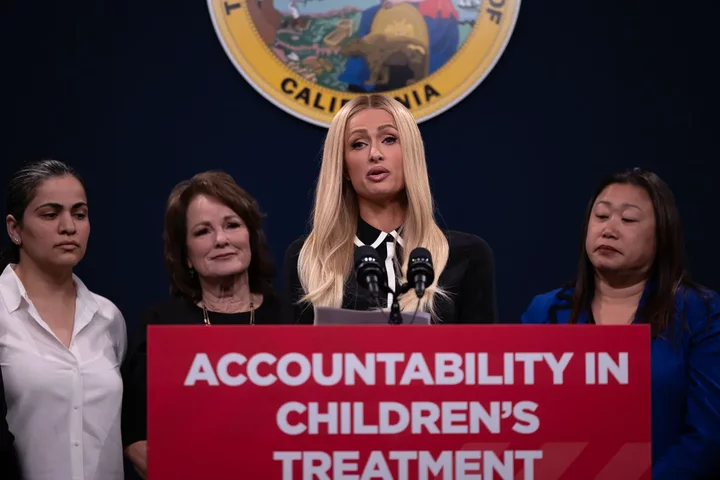Flanked by legislators, Paris Hilton speaks in support of Senate Bill 1043 during a press conference at the Capitol Annex Swing Space on April 15, 2024. Photo by Miguel Gutierrez Jr., CalMatters
Beginning Jan. 1, hundreds of state-licensed residential treatment centers for children and youth up to age 21 operating in California must comply with a new law that brings greater transparency — particularly when they use restraints and seclusion rooms.
After restraining a youth, or putting them in a seclusion room, the facility is required to provide a report to both the youth and to their parent or guardian. The report must include a description of the incident; which staff members were involved; the rationale behind their actions; how long the incident lasted; and other details.
A copy of the report must be provided to the California Department of Social Services within seven days. The department is required to review reported incidents for any health and safety violations and, if needed, investigate the incident.
Another provision of the law, requiring the department to make data about these incidents publicly available on its website, doesn’t take effect until Jan. 1, 2026. Then, parents or guardians weighing the difficult decision to send their children to these facilities can access information about any potential misuse of restraints and seclusion rooms.
One of the most widely-recognized champions of the bipartisan measure as it advanced through the Legislature was Paris Hilton. In April, the hotel heiress, socialite and media personality visited the state Capitol to advocate on behalf of the legislation, and recount the physical and emotional abuse she experienced while living at youth treatment centers in California and other states.
A vocal critic of the “troubled teen industry,” Hilton praised the passage of the law in August.
“For too long, these facilities have operated without adequate oversight, leaving vulnerable youth at risk,” Hilton said in a statement. “I hope our state is the standard for transparency and accountability in these facilities moving forward.”
In 2021, California prohibited sending troubled youth, including foster children, to out-of-state, for-profit treatment centers after reports of rampant abuse. As an alternative, youths can be sent to short-term therapeutic facilities licensed by the state’s social services department. A year later, California passed a law to fund crisis residential treatment facilities for children on Medi-Cal.
###
CalMatters.org is a nonprofit, nonpartisan media venture explaining California policies and politics.

CLICK TO MANAGE